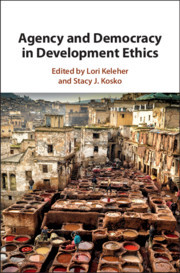Description
Agency and Democracy in Development Ethics
Coordinators: Keleher Lori, Kosko Stacy J.
Economists, philosophers, and policy experts from the Global North and South advance the conversation on the ethical dimensions of agency and democracy in development.
Language: English
Subject for Agency and Democracy in Development Ethics:
Publication date: 03-2019
486 p. · 15.6x23.5 cm · Hardback
486 p. · 15.6x23.5 cm · Hardback
Description
/li>Contents
/li>Biography
/li>
A diverse set of expert voices from the Global North and South - philosophers, economists, policy and development scholars and practitioners - explore two themes central to development ethics: agency and democracy. Established luminaries in development ethics engage with the book's themes alongside fresh voices on the way to becoming familiar figures in the field. Their essays work within diverse areas of development studies, including human security and human rights, democratic governance in theory and practice, the capability approach, gender and development, and applied and theoretical critiques of the philosophical underpinnings of various accounts of development. The result is a varied and comprehensive discussion of current work in development ethics that significantly advances our understanding of theoretical and practical work of development. This book will interest students, scholars, and practitioners of global justice, human rights, international development and political philosophy.
Introduction Lori Keleher and Stacy J. Kosko; Part I. Development Ethics: 1. Why development needs philosophy Lori Keleher; 2. What is development? Eric Palmer; 3. Public goods and public spirit: reflections on and beyond Nussbaum's political emotions Des Gasper and Flavio Comim; 4. Expanding a constricted moral lens: LGBTI persons, human rights, and the capabilities approach Chloe Schwenke; 5. Peacebuilding, development assistance, ethics and agency Nigel Dower; Part II. Agency: 6. Expanding agency: conceptual, explanatory, and normative implications Christine M. Koggel; 7. 'Reason to value': process, opportunity, and perfectionism in the capability approach Serene J. Khader and Stacy J. Kosko; 8. The multidimensionality of empowerment: conceptual and empirical considerations Alejandra Boni, Jay Drydyk, Alexandre Apsan Frediani, Aurora López-Fogués and Melanie Walker; 9. Agency, income inequality, and subjective well-being: the case of Uruguay Andrea Vigorito and Gonzalo Salas; 10. The legal status of whales and dolphins: from Bentham to the capabilities approach Rachel Nussbaum Wichert and Martha C. Nussbaum; Part III. Democracy: 11. On some limits and conflicts in participatory democracy Luis Camacho; 12. An agency-focused version of capability ethics and ethics of cordial reason: the search for a philosophical foundation for deliberative democracy Adela Cortina; 13. The double democratic deficit: global governance and future generations Frances Stewart; 14. Deliberative democracy and agency: linking transitional justice and development Colleen Murphy; 15. Consensus-building and its impact on policy: the National Agreement Forum in Peru Javier M. Iguíñiz Echeverría; Part IV. Development Ethics, Agency, and Democracy: New Challenges and New Directions: 16. From agency to perfectionist liberalism David A. Crocker; 17. Perfectionist liberalism and democracy David A. Crocker.
Lori Keleher is an Associate Professor of Philosophy at New Mexico State University in Las Cruces, New Mexico. She is on the Executive Board of the International Development Ethics Association (IDEA). She is also on the Executive Council and a Fellow of the Human Development Capability Association (HDCA). She is the co-editor of the Routledge Handbook of Development Ethics (2018).
Stacy J. Kosko is Assistant Research Professor at the Center for International Development and Conflict Management, University of Maryland, College Park. She has numerous articles and chapters in print on issues related to development ethics and human rights. She is on the Executive Board of the International Development Ethics Association (IDEA) and the Executive Council of the Human Development and Capability Association (HDCA).
Stacy J. Kosko is Assistant Research Professor at the Center for International Development and Conflict Management, University of Maryland, College Park. She has numerous articles and chapters in print on issues related to development ethics and human rights. She is on the Executive Board of the International Development Ethics Association (IDEA) and the Executive Council of the Human Development and Capability Association (HDCA).
© 2024 LAVOISIER S.A.S.



